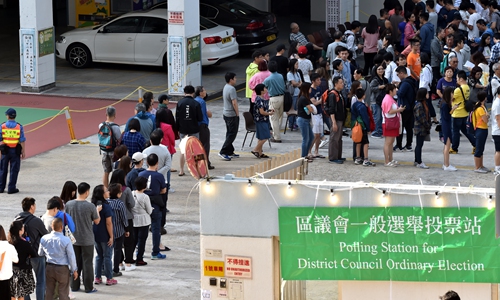
Hongkongers on Sunday line up in front of a polling station to vote in the district council elections. Photo: IC
The results of the Hong Kong District Council elections have triggered online discussions among Chinese mainland netizens, with many expressing their dissatisfaction. As the mainland has attached great importance to the Hong Kong situation, such online reaction is to be expected as mainland netizens are patriotic and hope the city can recover.
Mainland Chinese should view the Hong Kong situation accordingly.
First, the issue should be perceived from an international perspective. Hong Kong's capitalist system has linked it with the West in many aspects. The protests that were ignited by the introduction of the extradition bill is an internal affair.
The demonstrations became devastating due to the hardline strategy implemented by the US against China. In this sense, dealing with the Hong Kong issue, to a large extent, is equivalent to handling relations with the US and the West. The challenge has grown bigger. China must face this development and deal with the situation with a firmer and more mature stance.
Hong Kong affairs should be examined within the framework of the "one country, two systems" principle. Hong Kong and the Chinese mainland have different political systems. Some Hongkongers do not have a clear understanding of national interests or their interests, and thus their attitude to oppose violence isn't clear. In other words, the issue hasn't been addressed decisively.
China needs to guide the Hong Kong situation toward healthy development under the principles of Basic Law, but also must be prepared for the possibility the city could go astray. The severity of the issue must be analyzed, whether it is out of control, or what the consequences would be, and so on.
The city's rule of law has been destroyed. Undoubtedly, this is a severe issue. Ending the violence and chaos is, first and foremost, the responsibility of Hong Kong society. The protesters have staged a show against the country, which has excited the US and other Western forces as they think it would cause trouble for Beijing.
The country's control over Hong Kong's constitution hasn't been affected. Rioters and their supporters have been unable to undermine it. The country's armed forces could turn the situation at any time, but so far, there has not been an urgent need for such action.
The "one country, two systems" policy is more complicated than first expected. The fundamental reason today is how the global situation is more complicated than it was decades ago. However, the issue remains an internal affair embedded in the policy's framework. Due to international interference, the city's affairs have become highly politicized among an evolving global landscape.
A practical and realistic approach is needed to find a solution. If previous policies have proven to be outdated and ineffective, then it's imperative that adjustments are made.
We must face the situation of the "one country, two systems" policy. It should not be assumed that a simple resolution is available based on Chinese mainland logic. It's abnormal for a modern city to ruin its modernity.
The mainland needs to strengthen communication with Hong Kong, which is not an easy task. The mainland should increase its level of intimacy with Hong Kong residents and reduce value differences through reform and concerted efforts.
If China can take the initiative in its competition with the US, it would build confidence among Hongkongers and inspire them to love the country while making the mainland more attractive from their perspective.




